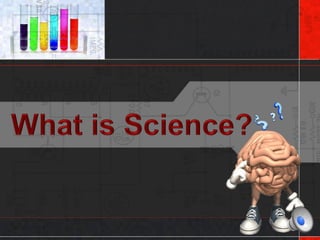
The Nature of Science
- 2. What is Science? Science is a process that uses observations and investigations to gain knowledge about nature.
- 3. • Must be capable of being disproved. • Must incorporate existing knowledge. • Must be able to absorb new findings. • Must be capable of predicting outcomes. • Must be stated in clear, unambiguous language. • Must be part of an ongoing process to gain knowledge and understanding. Requirements for Science
- 4. • Cannot answer questions about the supernatural. • Cannot answer questions about morality. • Is not democratic. Limits of Science
- 5. What is the Scientific Method? - an organized set of investigational procedures -usually presented as steps to be followed
- 6. 1. State the Problem • Why? • How? • Should be stated in a clear and concise manner
- 7. 2.Gather Information & Make Observations Learn about the background of the problem from: –Your own research –Research from other scientists
- 8. 2.Gather Information & Make Observations 2 types of observations: Qualitative: describe characteristics, but do NOT involve numbers (He is tall.) Quantitative: involve measurements and numbers (He is 6’11”).
- 9. 3.Form a Hypothesis • A hypothesis is NOT a guess. • A prediction of what you think will happen under certain conditions based on what you know from observations or research. • State your prediction in measurable terms so that it can be tested.
- 10. 10 4. Test the Hypothesis • An experiment is a set of steps you follow to test a hypothesis • The procedure or steps of your experiment should be very detailed.
- 11. 5. List and Analyze the Results
- 12. 6. Draw a Conclusion • Looking at the results and comparing them with the problem • Was your hypothesis correct? • WHY or WHY NOT? Explain!!! • A clear and concise answer to the orginal question.
- 13. 7. Report Results • The results and conclusions are communicated to the public or published in a scientific journal. • This is important both to disseminate knowledge and to allow other scientists to test, replicate, and question the results.
- 14. Repeatability • If the experiment is well-designed, then the outcome should be the same whenever the experiment is replicated. • Repeatability, getting the same results every time, is an important requirement of science and a major difference between science and other ways of gaining knowledge.
- 15. Review: Scientific Method 1.State the Problem 2.Gather Information and make Observations 3.Form a Hypothesis 4. Test the hypothesis. 5. List and Analyze the Results 6. Draw a Conclusion 7. Report Results
- 16. An Important Note! • The steps presented are VERY simplified in order to introduce the main features of scientific thinking. • In reality, scientists engage in many different activities in many different sequences. Investigations often involve repeating the same steps many times to account for new information and ideas.
- 17. In Other Words… the process of science is exciting, dynamic, and unpredictable. Science relies on creative people thinking outside the box!
Notas del editor
- Experiment; steps
